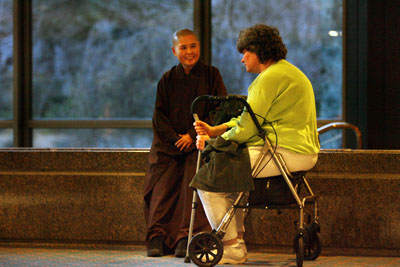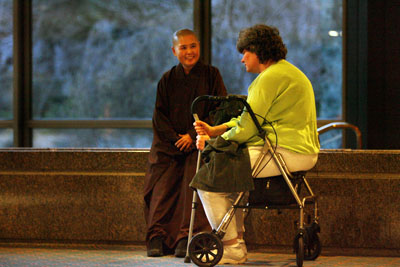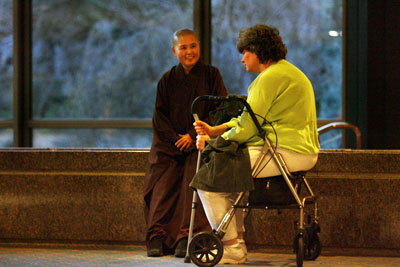
(RNS4-MAR25) Venerable Kong Dow, a Buddhist nun, talks with patient Lisa Morek before the start of a group meditation session at the Cleveland Clinic Center for Integrative Medicine. Jinny Tavee, Clinic neurologist and Dow’s daughter, is leading a study to find how meditation affects the pain and fatigue of MS and neuropathy patients. For use with RNS-MEDITATE-HEALTH, transmitted March 25, 2009. Religion News Service photo by Gus Chan/The Plain Dealer.

(RNS4-MAR25) Venerable Kong Dow, a Buddhist nun, talks with patient Lisa Morek before the start of a group meditation session at the Cleveland Clinic Center for Integrative Medicine. Jinny Tavee, Clinic neurologist and Dow’s daughter, is leading a study to find how meditation affects the pain and fatigue of MS and neuropathy patients. For use with RNS-MEDITATE-HEALTH, transmitted March 25, 2009. Religion News Service photo by Gus Chan/The Plain Dealer.

(RNS4-MAR25) Venerable Kong Dow, a Buddhist nun, talks with patient Lisa Morek before the start of a group meditation session at the Cleveland Clinic Center for Integrative Medicine. Jinny Tavee, Clinic neurologist and Dow’s daughter, is leading a study to find how meditation affects the pain and fatigue of MS and neuropathy patients. For use with RNS-MEDITATE-HEALTH, transmitted March 25, 2009. Religion News Service photo by Gus Chan/The Plain Dealer.
CLEVELAND — Before the group of about 50 people finished their break and found a comfortable spot in the open meeting area for their fourth and final meditation, Venerable Kong Dow, a Buddhist nun, gave them some advice.
“You catch the thoughts,” she said, her hand shooting out from the side of her red robe and snatching at the air in front of her face. “You catch it, fast, and put it aside. Soon you get good at catching the thoughts fast as they come up.”
“When you have bad thoughts, you have (a) bad brain,” she said, in an effort to simplify the practice of mindfulness, a type of Buddhist meditation that aims to achieve awareness of the present moment and the senses, and to quiet a normally restless and overactive mind.
For more than half of the people meditating with her at the Cleveland Clinic Center for Integrative Medicine, the exercise had meaning beyond an evening of relaxation and a two-hour break from the daily rush of stress.
Thirty-six of the people are patients with multiple sclerosis and neuropathy who have been participating in a clinical study to see if meditation can help with the pain and fatigue caused by their illness.
“Unfortunately, these patients have been told they have a chronic neurological disease, there’s no known cure, and doctors, including myself, end up throwing medications at them,” said Clinic neurologist Jinny Tavee, who also happens to be Dow’s daughter.
“I decided, let’s do something that can make a difference — let’s try something,” she said.
Tavee already knew that meditation could be life-changing. Her mother became a Buddhist nun six years ago after a very normal American lifestyle as a “soccer mom.”
“We imported her just for two months to help with this study, to see if meditation can improve neuropathy and MS,” Tavee said.
The idea isn’t that far-fetched, as strange as thinking — or not-thinking — your way to health might sound.
The earliest studies on the health effects of meditation were published in the late `60s, when Harvard cardiologist Herbert Benson began sneaking practitioners in the back door of his lab.
“I was already being told, `You’re injuring your career in studying stress,’ so meditation was beyond the pale,” of worthwhile scientific study, Benson explained.
At the time, Benson, who’s now director emeritus of the Benson-Henry Institute for Mind Body Medicine at Harvard, was studying what is now known as “white coat hypertension” — the phenomenon of a patient having high blood pressure only in the doctor’s office, an anxiety-induced condition.
Benson found that practitioners of Transcendental Meditation — a twice-daily repetition of a mantra to help achieve a relaxed, focused state — exhibited lower metabolism, heart rates, blood pressure, and rates of breathing, and had slower brain waves.
Many studies have since backed up his research in TM and other forms of meditation, although poor study design and small study groups have often made results difficult to interpret.
Indeed, rigorous studies of meditation, like many alternative therapies, are hard to come by. A Canadian research group reviewing studies on mindfulness meditation recently concluded that there wasn’t enough evidence to determine its effectiveness in reducing stress or treating depression or anxiety.
Yet there have been so many suggestive results from small studies that the National Institutes of Health — mostly through the National Center for Complementary and Alternative Medicine (NCCAM) — has been funding dozens of larger trials examining the effectiveness of meditation on conditions as diverse as irritable bowel syndrome, high blood pressure, insomnia and nicotine dependence.
Another reason to study meditation’s health effects is its increasing popularity. While meditation isn’t exactly become mainstream yet, a 2007 survey by NCCAM found that 9.4 percent of U.S. adults had meditated in the past year, up from 7 percent in 2002.
Benson’s group at Harvard continues to study the “relaxation response,” the name he has given to the anti-stressed state induced by many forms of meditation, guided imagery, and tai chi and other kinds of moving meditation. The same response is provoked in many Western religious contexts, he said — when Catholics pray the rosary or practice centering prayer, for example.
His research has shown that the relaxation response may make the brain less responsive to the stress hormone norepinephrine, and that long-term meditation may even increase the body’s ability to produce antioxidants.
The Cleveland Clinic’s meditation study will finish up at the end of the month, to the chagrin of many of the patients and Clinic staff who have joined them in their weekly two-hour session.
Mike Schupp, 56, was diagnosed with MS two years ago. The former wrestling coach had never considered meditation for his health but, after two weeks in the study, found himself practicing tai chi and sitting meditation techniques at home.
“If this was going every Tuesday, forever, whenever my driver would bring me here, I would go.”
(Brie Zeltner writes for The Plain Dealer in Cleveland.)




